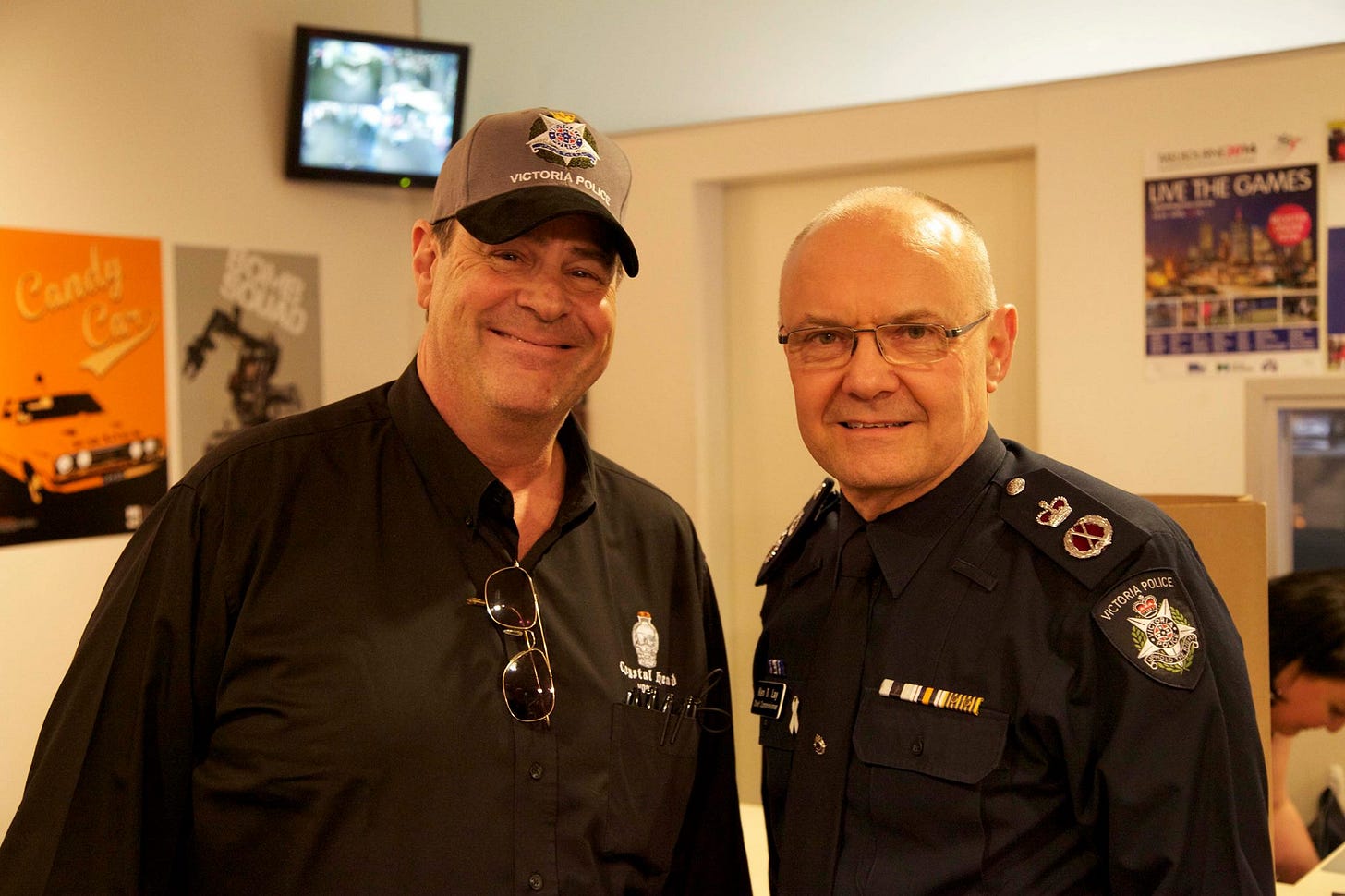I was working for the Chief Commissioner of Victoria Police, Ken Lay, when he popped his head over my cubicle one day and excitedly told me that Dan Aykroyd was coming to visit us in the office soon. Like, within the next 30 minutes.
I paused, embarrassed. “Who’s Dan Aykroyd?”
The chief had a pained look: I think he was pondering whether or not I was taking the piss out of his enthusiasm. Now, I know the Dan Aykroyd, of course. Grosse Pointe Blank’s one of my favourite films, and like most humans I’m familiar with The Blues Brothers. As it happens, I’ve also visited both Chicago and Toronto’s Second City comedy club where he started.
But this Dan Aykroyd, the one Ken was saying was about to visit? No idea. So strange did it seem that the Dan Aykroyd was about to arrive, that I could only assume that this Dan Aykroyd was an old legend of the force – a man who’d once solved a notoriously complex murder case, perhaps, or had heroically resolved a violent siege. A man of stature. Of medals. And of a name that, no doubt, had been the font of much teasing in his life.
“Dan Aykroyd,” the chief said.
“Dan Aykroyd?”
“Dan Aykroyd,” he said again, emphatically, his patience tiring.
“I’m sorry, Ken, but I don’t know this Dan Aykroyd.”
By now it was obvious that the chief was thinking that his advisor was either a moron or clinically obtuse. “You don’t know Dan Aykroyd?”
“No,” I said, and it was now my turn to be annoyed: Ken’s seeming insistence that I, a freshly appointed civilian advisor, be familiar with all the arcane lore of a 150-year-old police force seemed unreasonable. Before starting the job, I’d read a history of Victoria Police written by a veteran officer, and I frequently spoke with senior coppers about their careers. I wasn’t incurious about the history and culture of the place. But, still: I did not fucking know this Mr. Aykroyd.
“The Blues Brothers?”
“What?”
“Dan Aykroyd.”
“Dan Aykroyd?”
“What have I been saying?”
“I know Dan Aykroyd.”
“But you’ve just—” his sentence went unfinished.
This exchange had been profoundly exhausting for both of us, and presumably for the colleagues listening. But at least our mutual bafflement was finally clearing. I explained to Ken that I did, in fact, know who Dan Aykroyd was, but that this seemed an unthinkable conflation of worlds to me, and so I’d assumed he was referring to some other obscure namesake. Ken accepted this, grateful for the ordeal to be over, but perhaps resentful that his news wasn’t met with the surprise and pleasure he’d anticipated.
Which now left the obvious question: Why the fuck was Dan Aykroyd coming to see us?
It turned out that the actor was in town hawking his recently launched vodka – the one in the skull-shaped bottle – and that he made a point of trying to meet the top cop in whichever jurisdiction he happened to be visiting (kind of like how Mick Jagger makes his way into the changerooms at international cricket matches).
Aykroyd was a police nut: he’d studied criminology and deviant psychology at university, and his maternal grandfather had been a lifelong Canadian Mountie. He collected police badges, uniforms, old motorbikes. He loved to ride shotgun with coppers on shift. He’d gone into business with several Toronto police officers. He was the national spokesperson for the Blue Line Foundation, which fundraises for small police departments. The man fucking loves police.
And so, as promised, Dan Aykroyd arrived. He did so like a cyclone makes landfall. There was a small entourage, plus some members of VicPol’s media team who were trailing him with a video camera. Aykroyd is an enormous man with an enormous voice, and he seemed innately comfortable with the gawking attention and with re-wiring the energies of those around him. What a strange and exhausting thing celebrity must be: to powerfully alter the atmosphere of whatever place you happen to be in.
Even a police headquarters.





